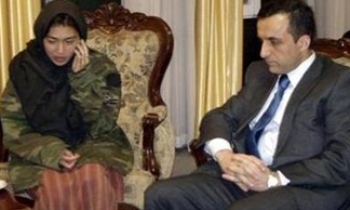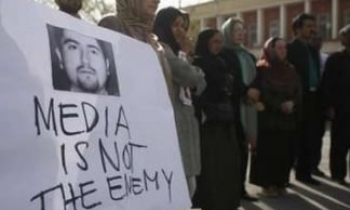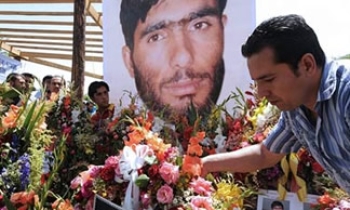In December 2005, the country's security agents seized Trevor Ncube's passport and he spent a week virtually under country arrest. He couldn't leave Zimbabwe legally because he had no passport.
Earlier this month Trevor Ncube, the publisher of South Africa's Mail & Guardian, Zimbabwe's Independent and the Zimbabwe Standard, spent a week virtually under country arrest when security agents in Zimbabwe seized his passport.
Ncube believes the security agents, who he says now rule the country, wanted him to do just that: Leave Zimbabwe illegally so that they could level criminal charges against him and take over his newspapers.
"They want my newspapers. They want the Zimbabwe Independent and The Standard," he says. "They have been unable to do with us what they have done with Ibbo Mandaza's newspapers and what they have done with the Financial Gazette, namely to control them through the C.I.O. buying into them through the backdoor.
"They know I stand to lose a lot if I am unable to return to South Africa. They think I will leave the country illegally so they can have something to pin on me. Then they can specify me and my newspapers and that way take over my business."
Trevor Ncube travels regularly between South Africa and Zimbabwe to run his newspapers. He publishes the only independent newspapers in Zimbabwe as well as South Africa's Mail & Guardian. He now has the uneasy distinction of being the first target of an escalating crackdown by the government against civic groups, nongovernmental organizations and other critics.
"If they think they can stop me from speaking against injustice, corruption and misgovernment by taking away my passport, then they are mistaken. It will not stop me," Ncube says.
But in a country with some of the most repressive media laws in the world and where journalists are under the constant scrutiny of security agents, it is really only a matter of time before his newspapers, too, are either banned outright or taken over by the country's dreaded secret police, the Central Intelligence Organization (C.I.O.).
Over the past five years, the Zimbabwean government has routinely persecuted, detained and harassed journalists in an attempt to deter them from reporting on violations of human rights, economic woes and political opposition to the regime.
Repressive legislation such as the Access to Information and Protection of Privacy Act (2002) which make it a crime to practice journalism without a government license, have been written into the statute books.
Many of the nation's most prominent reporters have been forced into exile and are now living in South Africa, other African nations, the United Kingdom and the United States. At least 90 such journalists are known to be in exile, making them one of the largest groups of exiled journalists in the world. Some of the exiled journalists left as a direct result of political persecution, others because the government's crackdown virtually erased opportunities in the independent press.
Speaking at a conference of his Zanu-PF party on Dec. 10, President Robert G. Mugabe vowed to take "stern action" against civic groups, nongovernmental organizations and other critics of his government. A resolution was later adopted at the conference welcoming moves to seize the passports of people "who go around demonizing the country."
"We want the security people to draw up a list of people like that and withdraw their passports," it said.
A list of people Zanu-PF sees as traitors has been around since Zanu-PF came into power in 1980. It has constantly been revised and the punishment the party meted out to its enemies has been changing with the changing times.
Journalists Geoff Nyarota, Nqobile Nyathi, Lloyd Mudiwa, Basildon Peta, Caroline Gombakomba and others are on the current list of people whose passports are to be seized if they try to enter or leave the country.
The travel ban follows an amendment to the constitution, ratified in September, that allows the government to restrict the right to freedom of movement by denying a passport to anyone wishing to travel outside the country "where it is feared or believed or known that the Zimbabwean in question will, during his or her travel, harm the national interest or defense interest or economic interest of the state."
Minister of Justice Patrick Chinamasa justifies withdrawing passports from critics of the government.
"There are people who gallivant across the globe calling for sanctions against the country. Those are the ones we are targeting. I don't want to mention names because they know themselves. If you are one of them, you are in for it," he says.
The ministries of Justice and Foreign Affairs are also deliberating on additional regulations that will make it mandatory for Zimbabweans to apply for exit visas if they are to travel outside the country.
Chinamasa does not deny or confirm that the government is considering imposing exit visas.
"Are you afraid?" he asks, instead. "Whether we introduce the visas you are talking about is not the issue. The issue is that we should not allow saboteurs to go round the world badmouthing the country."
Trevor Ncube says there is nothing new about what the Mugabe regime is doing.
"This is about a regime that wants to control the minds of people," he says. "They are basically saying that you can't speak out, because if you do, you lose your passport."
Trevor Ncube is lucky.
He got his passport back after a week because although the amended constitution now allows the Mugabe government to seize passports of those it perceives to be acting against national interest, there is no corresponding piece of legislation which sets specific guidelines as to which offences warrant the withdrawal of passports.
That Ncube got his passport back does not mean the Mugabe regime will stop confiscating its critics' passports. It means the regime will close the legal loophole that allowed Ncube to reclaim his passport and retain control of his newspapers.
Having lost this round, the regime will be all the more determined to make sure that the other 64 critics on the travel ban list do not slip out of the its grip. The regime will close the loophole that forced it to return Trevor Ncube's passport and the next time he returns to Zimbabwe, he will most likely not be able to leave the country legally.
This can be seen by the fact that as Ncube was getting his passport back, another outspoken critic of the Zimbabwe government, Raymond Majongwe, who is the secretary general of a national teachers union, had his withdrawn. It was seized at Harare International Airport on Majongwe's return from a trip abroad.









